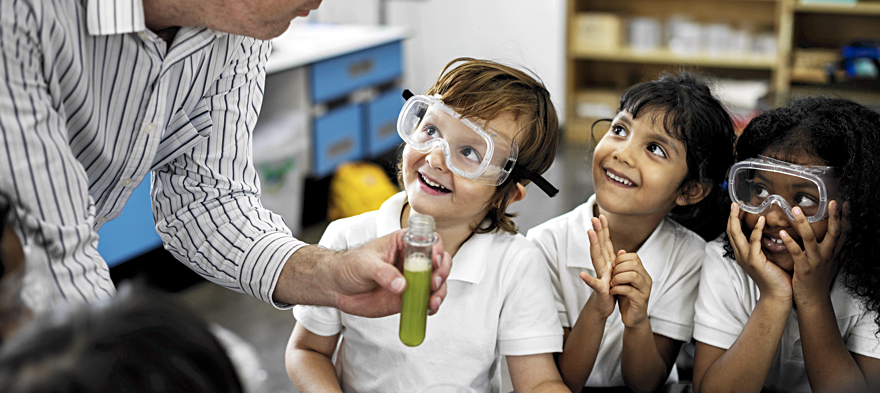
Jun 2, 2021 12:00:00 AM
As the end of one of the most difficult school years approaches, and after more than a year of educators transforming the way they teach and interact with their students, scientific developments are allowing classrooms to start returning to a more hands-on teaching approach.
In addition to health advancements such as vaccines and testing, remote learning was made possible by advancements in telecommunications. The extraordinary scientific achievements that saved lives and allowed us to stay connected during the COVID-19 pandemic are worth acknowledging and celebrating in the classroom. Educators play a critical role in building students’ lifelong commitment to curiosity, and can use this opportunity to spark students’ interest in the science that is currently making a huge difference in their daily lives.
Over the past year, students have seen firsthand the benefits of the scientific process and the perils of ignoring scientific warnings.
In some cases, science has become politicized, causing confusion and mistrust. Students can and will be leaders in understanding and defending science. Just as educators teach skills that build students’ scientific literacy to help them evaluate facts, they can offer ways for students to affirm confidence in the Science and Engineering Practices set forth in the Next Generation Science Standards.
The process of science is important. While in some cases during the pandemic the scientific process has been accelerated, the careful steps of testing ideas from hypotheses to solution were still carefully followed. For students, that means the scientific practices that they learn and use in the classroom are the same that led scientists to today’s solutions.
A new Trust Science pledge, launched in conjunction with the UNESCO-organized International Day of Light celebrated last month, offers one particularly useful teaching tool. The pledge is a worldwide campaign to promote support for the scientific process and to acknowledge the many benefits of science to society.
With founding signatories including Nobel laureates, presidents and CEOs of major scientific bodies, as well as scientists and students from more than 20 different countries, the pledge asks signers to pledge:
Trust in evidence-based, scientific facts is essential for providing sustainable solutions to today’s challenges. By adding my name to this declaration and pledge, I recognize the key role that scientific research and discovery plays in improving quality of life for all.
In addition to having students read and sign the pledge, teachers and students can use International Day of Light activities in the classroom. For instance, the Exploratorium’s Science Snacks webpage has a Special Collection dedicated to cheap and simple hands-on activities that explore light.
Light science has contributed to breakthroughs in coronavirus treatment and vaccine development—concrete examples that relate directly to students’ lives.
For example, PCR (or Polymerase Chain Reaction) testing for COVID-19 detection relies on the use of LED lights, photodetectors and optical filters. Scientists have developed optical chips to detect COVID antibodies, and use lasers to treat the disease. Furthermore, light science led to many breakthroughs that allowed video conferencing for school and kept family and friends connected during the pandemic.
Providing examples to students of how science improves their lives brings the theoretical concepts of subjects like physics and biology into the here and now, and gives students the understanding they need to have the agency to make well-informed decisions for themselves and their families. It’s easier to trust science when you understand how it can help you, and how you can be directly involved in improving it.
The 21st Century will see many more challenges beyond this pandemic, and the next generation will be responsible for the scientific solutions of our modern age. As we return to classrooms worldwide, the return of in-person, inclusive, inquiry-driven, hands-on experimentation is vital for cultivating a classroom community where students see themselves as future scientists and engineers. A dedicated effort to building—and in some cases, rebuilding—trust in science will prepare students to be the scientifically informed leaders we desperately need.
Dr. Desiré Whitmore is the senior physics educator and staff physicist at the Exploratorium in San Francisco, California.
The story you tell yourself about your own math ability tends to become true. This isn’t some Oprah aphorism about attracting what you want from the universe. Well, I guess it kind of is, but...
If you have a child with disabilities, you’re not alone: According to the latest data, over 7 million American schoolchildren — 14% of all students ages 3-21 — are classified as eligible for special...
The fight for educational equity has never been just about schools. The real North Star for this work is providing opportunities for each child to thrive into adulthood. This means that our advocacy...
Your donations support the voices who challenge decision makers to provide the learning opportunities all children need to thrive.
Ed Post is the flagship website platform of brightbeam, a 501(c3) network of education activists and influencers demanding a better education and a brighter future for every child.
© 2020–2024 brightbeam. All rights reserved.
Leave a Comment